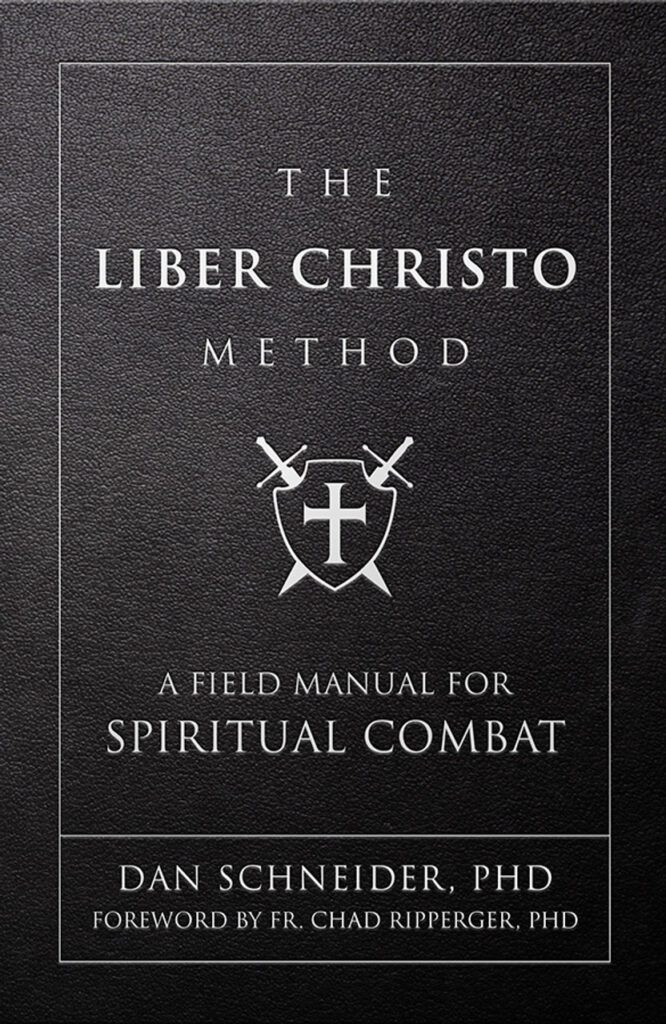Liber Christo is a tactical field manual for everyday spiritual warfare. A member of Fr. Chad Ripperger’s exorcism team, author Dan Schneider guides readers through all tactics, theology, and prayers they need to defend their souls.
Traditionally, diabolic activity is distinguished between ordinary and extraordinary. Temptation—physical or psychological—is part of the ordinary (common to all) way the devil operates. According to Father Amorth, “The devil’s mission in the world is to seduce souls, to lead each man and woman on the wayward paths of sin; and the principal path of this tragic mission is the path of temptation.”
Ordinary Diabolical Activity
Fr. Francesco Bamonte, president of the International Association of Exorcists, describes temptation as when “the enemy attempts to seduce us with sense realities, acting on our senses (sight, touch, hearing, smell, and taste).” This seduction, he says, also includes our memory, imagination, and intellect. That is, the demon traffics in the senses and seeks to manipulate how we appropriate the external world into our higher, internal faculties.
His goal, according to Father Bamonte, is “to arouse the consent of our free will to do evil in hopes of stimulating and further reinforce our dependence upon him.” That is, the ordinary activity of the evil one is to use the sensory data presented to us to habituate us in sinfulness in thought, word, and deed.
God will never allow you to be tempted beyond what you can endure, however, and when you conquer various temptations, you grow in virtue, self-mastery, and mastery over the enemy.
Temptation is, as Father Ripperger writes, “a school of humility” because it reveals the deficiencies in our formation and causes us to “distrust ourselves because of our weaknesses.” He notes also that by “fighting demons and vanquishing them, the demons become weaker, not only in the lives of the individual who fights them but in the lives of others as well.” Thus, he states, “people have to understand that it is not unfair for God to allow this because He is actually giving them something greater.”
The demon becomes an instrument of both our sanctification and education. Saint Bonaventure gives four reasons why God allows demons to influence a person: to reveal God’s glory, to punish sin, to rebuke a sinner, or to educate a person. That is, God allows all demonic activity (whether ordinary or extraordinary) for a greater good.
Extraordinary Diabolical Activity
Although the demon may probe your perimeter through various temptations, therefore, when you resist temptation, you keep the enemy “outside the wire.” When given the opportunity, however, the demon will slip past the claymore mines, get “inside the wire,” and exert himself beyond ordinary temptation. Extraordinary diabolic activity, according to Father Ripperger, “is that which goes above and beyond what is normal or the ordinary diabolic influence, which all men must endure.” Father Bamonte describes it as “the devil’s intervention on matter.”
Father Amorth lists six ways of extraordinary diabolic activity: physical pain, demonic possession, diabolical oppression, diabolic obsession, diabolic infestation, and diabolic subjugation. Notably, Father Bamonte emphasizes that extraordinary diabolic activity is the result of original sin and can often be due to “one’s own culpability” to include sins of:
• superstition and occult practices, such as participation in (or even being present at) sessions with psychics or fortune tellers;
• use of amulets and talisman; recourse to mediums, sorcerers, witches, tarot card readers, or having attempted any of these on your own;
• the practice of certain meditation techniques like transcendental meditation, Reiki, opening oneself to “chakras” or other New Age practices;
• submitting oneself to “spiritual cleansing,” being present at voodoo, Macumba or other rituals; and
• membership in secret societies or satanic groups. He explains further that one can be vulnerable to demonic influence particularly when combined with “alienating vices” such as “alcohol abuse, drugs, sexual perversion, and blasphemy.”
Such activities, he says, “weaken the individual and open him up to the devil’s extraordinary activity.” The motives for participation in witchcraft, says Father Amorth, are “wealth, power, vice, and more.” While the enemy probes your “wire” through temptations, he can use other tactics, such as curses, to gain quicker access. As Father Bamonte notes, the demon can exploit such vulnerabilities (“alienating vices”) through the actions of someone else who has performed occult rites and curses against him. That is, certain behaviors alienate you from God’s friendship and protection, which can make you vulnerable to curses and the effects of the occult activity of others. Here we present the devil’s extraordinary and intensifying activity “inside the wire” of a person’s interiority along a threefold scale of oppression-obsession-possession. These are defined as:
Oppression—a form of extraordinary diabolic influence in which a demon attacks one’s externals; first stage in the progression toward classic possession and often experienced as a heaviness, malaise, melancholy, or depression. As the influence of the diabolical increases during this phase, the individual begins to lose focus, especially on vocational obligations.
Obsession—Spiritual obsession can be seen in marked neurotic and abnormal mental symptoms due to the persevering efforts of an evil spirit to gain mastery over him; the second stage in the progression toward classic possession where one is besieged psychologically—that is, intellectually and emotionally—by demons. There will be psychological as well as physical indicators of the diabolical presence. It is during this phase that the demon begins to “move in” (increased and persistent activity in the interiority of a person). A psychological obsession is recurrent and persistent thoughts, urges, or images that are experienced as intrusive and unwanted.
Possession—the phenomenon in which the devil invades the body of a living person and moves the faculties and organs as if he were manipulating a body of his own. Three types of possession are as follows:
Classic: usually a gradual progression through the stages of oppression and obsession.
Partial: usually through a pact made in exchange for a favor with a demon such that the demon is present to that activity and when the person seeks God, demonic affliction arises; sometimes can be ethnic/cultural related.
Transient: where rights are given by someone else, usually familial such as in Freemasonry or other witchcraft, and the demon becomes present when the rights are challenged; akin to “peanut allergy” such that the effects arise situationally. The demonic claim will (as a rule) spike when the activity associated with the possession/curse is performed.
ooo
This article is taken from a chapter in The Liber Christo Method by Dan Schneider, PhD which is available from TAN Books.








